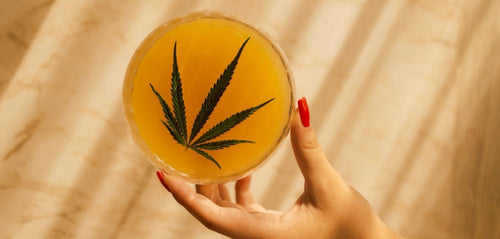#9: The Truth About THC: Why Cannabis Strength Isn’t Measured by THC Alone
#9: The Truth About THC: Why Cannabis Strength Isn’t Measured by THC Alone
If you’ve been paying attention to the cannabis industry over the past few years, you may have noticed that THC levels are on the rise. Nowadays, strains boasting THC concentrations of over 30% are becoming increasingly common. That is a stunning statistic, considering that in the 60's, cannabis strains boasted THC levels between 3-7%.
In alcohol, the strength of a drink is measured by the alcohol by volume (ABV) percentage. So it may seem logical that a higher THC concentration would be the barometer for determining the quality or strength of cannabis. But that's not necessarily the case. In truth, other determining factors must also be taken into consideration.
Factors such as terpenes and the entourage effect play a major role in determining the overall potency and effect of a particular strain. Yes, THC is the main psychoactive compound in cannabis, but it’s not solely responsible for producing the effects users experience. This is because cannabis contains hundreds of other compounds, including terpenes, which interact with THC in a process known as the entourage effect. Let's break this down a bit further and explore why THC isn't the barometer for quality and strength.
Why THC became the measure of cannabis potency

For decades, THC levels have been used as an indicator of which strains are more potent than others but that's because there wasn’t a better option. Until very recently, the only test generally used by producers to determine the strength and quality of their strains was a THC test. Long before the entourage effect and terpenes were understood, THC was the main focus, and it quickly became what everyone looked for when evaluating a strain’s potency.
Over time, as more research was conducted into cannabis, scientists began to understand that other factors, such as terpenes and the entourage effect, played a role in determining the overall effects of a particular strain. But by then, it was too late. The stigma associated with higher THC percentages remains today and producers are more invested than ever in increasing the THC concentration of their strains.
The impact of terpenes on potency and effects

Cannabis contains hundreds of compounds, including over 100 different terpenes. Terpenes are the essential oils that give each strain its unique scent and flavour. In addition to their flavour profiles, these compounds have a major impact on the effects produced by THC. Have you ever wondered why two strains boasting the same THC concentration can produce different effects? That’s because of the terpenes.
For instance, some terpenes like limonene and pinene can increase alertness and memory, while linalool and myrcene have sedating effects. Without terpenes, THC would produce a much different effect—one that is less nuanced and powerful than what you experience with the entourage effect. Terpenes thus play an important role in the entourage effect – the combined effects of all cannabinoids and terpenes found in cannabis.
The entourage effect: What is it?

When you consume cannabis, your body breaks down THC and other compounds, such as terpenes and flavonoids, into molecules that interact with the body’s endocannabinoid system. This is known as the entourage effect – a phenomenon where all of the compounds in cannabis work together to produce different effects.
Studies suggest that the entourage effect can significantly increase or decrease the intensity of certain cannabis effects. For instance, research has indicated that when terpenes such as caryophyllene and myrcene are combined with THC, they can reduce anxiety and increase the “high” feeling. On the other hand, when terpenes like a-bisabolol and linalool are mixed with THC, its effects may be mitigated.
Other factors that affect cannabis potency and quality
Aside from terpenes and the entourage effect, other factors also affect cannabis potency and quality. Growing conditions and soil composition, for instance, can have an impact on the quality of the end product. Furthermore, the way cannabis is harvested, handled, cured and stored could also determine its potency and effects. For example, living soil and organic growing methods can lead to healthier and more potent buds, while curing cannabis too quickly leads to lower levels of terpenes and other compounds.
The takeaway
Ultimately, THC levels can be useful in determining which strains may be more potent, but they should not be the only measure of quality when it comes to cannabis. The entourage effect and terpenes are just as important in determining the overall effects of a strain, so make sure you take them into account when choosing a strain.
Additionally, growing conditions, harvesting techniques and other factors can also influence the quality of cannabis. To get the most out of your cannabis experience, check for producers that take great care in their growing and curing processes. By doing so, you can ensure that the bud you’re getting is of high quality and potency. We hope this article has shed some light on the truth about THC and why cannabis strength isn’t measured by it alone. Happy exploring!
Back to all posts










